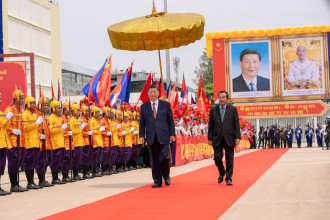-1731996506.jpeg)
The Friedrich Naumann Foundation for Freedom South Asia, held an event titled ‘South Asia and Germany: Perspectives on Economy and Security’ in New Delhi, on October 22 and 23. The programme provided a comprehensive platform for exploring the dynamic relationship between Germany and South Asia. It illuminated key themes around economic collaboration, skilled labour migration, security cooperation, and geopolitical complexities, with a focus on strengthening ties between Germany and India, the dominant player in the region.
Germany’s Strategic Engagement with India
Germany has recognised India’s transformative journey as the world’s most populous democracy. With its burgeoning economy, political stability and social progress, India has emerged as a significant global player. This evolution has prompted Germany to prioritise its relationship with India, particularly under its new Asia strategy.
Economic Collaboration and Skilled Labour Migration
Germany faces a critical annual shortage of approximately 500,000 skilled workers, posing significant challenges to its economy. To address this gap, Germany is actively engaging with India’s young and educated workforce. As part of its new skilled labour migration strategy, Germany has designated India as a priority partner. Efforts to streamline pathways for Indian talent are underway, fostering opportunities for skilled Indians to contribute to Germany’s economy.
This collaboration presents a win-win scenario: India benefits from job opportunities abroad for its growing skilled population, while Germany secures the workforce necessary to sustain its economic competitiveness. However, challenges such as language barriers, cultural integration and bureaucratic procedures need to be addressed to realise the full potential of this partnership.
-1731996506.jpeg)
-1731996505.jpeg)
Trade and Economic Diversification
Germany’s approach to trade diversification, particularly its aim to reduce dependence on China, aligns closely with its partnership with India. Strengthening economic ties with India supports Germany’s agenda of a rules-based multilateral trade system. A prospective EU-India Free Trade Agreement is a focal point, aimed at enhancing fair and open trade.
India, on its part, has made remarkable strides in its economic journey, with robust growth, improvements in health and education, and a focus on digital transformation. Germany’s investment in India aligns with these developments, offering mutual benefits in sectors like technology, renewable energy and advanced manufacturing.
Security Cooperation in South Asia
Germany acknowledges India’s role as a stabilising force in South Asia, a region often fraught with geopolitical tensions. Regional stability is paramount, given the increasing influence of China and the persistent India-Pakistan rivalry characterised by nuclear brinkmanship.
Germany has demonstrated its commitment to India as a security partner through initiatives such as military cooperation and naval visits. These efforts aim to ensure peace and security in the Indo-Pacific, a region critical to global trade and strategic balance. Enhancing maritime cooperation between Germany and India underscores a shared interest in countering unilateral actions and upholding international law.
Challenges in South Asia’s Geopolitical Landscape
South Asia’s geopolitical dynamics present unique challenges that complicate regional security and economic integration. India’s dominance, historical rivalries, and external influences such as China’s infrastructure investments add layers of complexity.
Regional Tensions and Military Dynamics
The region’s longstanding India-Pakistan conflict continues to threaten stability, with issues such as cross-border terrorism and nuclear brinkmanship persisting. Meanwhile, China’s increasing military and economic presence in South Asia, including through its Belt and Road Initiative, raises concerns about debt dependency and sovereignty for smaller nations.
Regional Cooperation and Economic Integration
Efforts like the South Asian Association for Regional Cooperation (SAARC) aim to foster collaboration, yet political tensions often hinder progress. High tariffs, non-tariff barriers, and inadequate infrastructure impede intra-regional trade, which remains significantly below its potential. Addressing these challenges requires a collective commitment to trust-building, streamlined customs procedures, and investment in connectivity.
Opportunities for South Asia
Despite these challenges, South Asia’s youthful demographic and growing economies present immense potential for development. By addressing disparities in job creation, gender participation, and infrastructure, the region can unlock sustainable growth.
India’s economic rise, coupled with its democratic framework, makes it an attractive alternative to China for global businesses seeking diversification. However, India must continue reforms to improve its ease of doing business, strengthen its infrastructure, and address skill gaps to fully realise its potential.
Germany and India: Partners in a Changing Global Landscape
Germany’s collaboration with India is set against a backdrop of shifting global dynamics. The ongoing realignment of supply chains and geopolitical power centres creates opportunities for Germany and India to lead in fostering resilient and inclusive economic systems.
Climate Change and Sustainable Development
Both nations share a commitment to addressing climate change and promoting renewable energy. Germany’s expertise in sustainable technology and India’s ambitious renewable energy goals, such as its target to achieve 500 GW of non-fossil fuel capacity by 2030, present avenues for robust collaboration.
Technological Innovation and Cybersecurity
Technological advancements also provide fertile ground for cooperation. Cybersecurity, in particular, emerged as a critical area of focus during the event. The rise of economic espionage and cyberattacks underscores the need for robust defences and international cooperation. Germany and India, as technology-driven economies, can collaborate on securing critical infrastructure and intellectual property.
Strengthening Regional and Global Partnerships
The panel discussions emphasised the importance of partnerships in creating resilient economies and secure regions. Germany’s engagement with South Asia, particularly India, serves as a model for leveraging shared values and economic synergies to address global challenges.
De-risking Economies and Diversifying Supply Chains
As businesses and governments seek to de-risk economies, India offers a compelling alternative with its skilled workforce, large consumer market, and commitment to democratic principles. Germany’s trade diversification efforts align with this goal, reducing reliance on singular markets and enhancing global trade stability.
Enhancing Connectivity and Trade Facilitation
Intra-regional trade in South Asia remains underutilised due to infrastructure gaps and political barriers. Addressing these challenges can unlock economic growth and foster integration. Germany’s expertise in logistics and trade facilitation can play a role in supporting South Asia’s connectivity ambitions.
-1731996505.jpeg)
Conclusion
The event highlighted the mutual benefits of Germany’s strategic engagement with South Asia, particularly India. By addressing shared challenges and leveraging complementarities, both regions can create a framework for sustainable growth and security.
Germany’s focus on skilled labour migration, trade diversification and security cooperation aligns seamlessly with India’s aspirations as a rising global power. Simultaneously, South Asia’s geopolitical complexities and economic potential, present opportunities for Germany to play a constructive role in fostering regional stability.
Through enhanced diplomacy, economic collaboration and shared values, Germany and South Asia can build a resilient partnership, contributing to global prosperity and security. The discussions in New Delhi reaffirmed the importance of continued dialogue and cooperation in navigating the challenges and opportunities of an evolving world order.
READ ALSO:
- FNF South Asia hosts webtalk on ‘BRICS Summit in Kazan: India’s Agenda’
- FNF South Asia webinar explores ecological challenges for conservation in the Bay of Bengal region
- FNF South Asia hosts webinar titled 'India Votes: Inclusive Democracy 2024'
- FNF South Asia holds conference to address LGBTQIA+ rights in South Asia, Europe
- FNF South Asia hosts webinar titled 'Empowering Voices: Exploring the Political Landscape for Women in South Asia'
- FNF hosts regional conference on ‘Rivers as Lifeline for South Asia’






